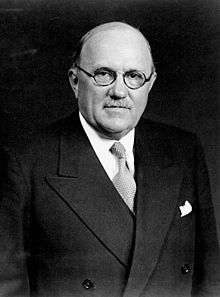Ernest Lapointe
Ernest Lapointe PC MP (October 6, 1876 – November 26, 1941) was a Canadian lawyer and politician. A member of Parliament from Quebec City, he was a top adviser to Prime Minister W. L. Mackenzie King, especially on issues relating to legal affairs, Quebec and French-speaking Canada.
Ernest Lapointe | |
|---|---|
 | |
| Minister of Justice Attorney General of Canada | |
| In office October 23, 1935 – November 26, 1941 | |
| Prime Minister | W. L. Mackenzie King |
| Preceded by | George Reginald Geary |
| Succeeded by | Joseph-Enoil Michaud (Acting) |
| In office September 25, 1926 – August 6, 1930 | |
| Prime Minister | W. L. Mackenzie King |
| Preceded by | Esioff-Léon Patenaude |
| Succeeded by | Hugh Guthrie |
| In office January 30, 1924 – June 28 1926 Acting: January 4, 1924 – January 29, 1924 | |
| Prime Minister | W. L. Mackenzie King |
| Preceded by | Lomer Gouin |
| Succeeded by | Hugh Guthrie (Acting) |
| Member of the Canadian Parliament for Quebec East | |
| In office October 27, 1919 – November 26, 1941 | |
| Preceded by | Wilfrid Laurier |
| Succeeded by | Louis St. Laurent |
| Member of the Canadian Parliament for Kamouraska | |
| In office February 12, 1904 – October 14, 1919 | |
| Preceded by | Henry George Carroll |
| Succeeded by | Charles-Adolphe Stein |
| Personal details | |
| Born | October 6, 1876 St-Éloi, Quebec, Canada |
| Died | November 26, 1941 (aged 65) |
| Political party | Liberal |
| Spouse(s) | Emma Pratte ( m. 1904) |
| Relations | Arthur-Joseph Lapointe (nephew) |
| Children | Hugues Lapointe |
| Alma mater | Laval University |
| Occupation | Lawyer |
Education, early career
Lapointe earned his law degree from Laval University. He was a practicing lawyer in Quebec City, and was appointed Crown Prosecutor for Kamouraska before entering politics.
Enters politics
He was first elected by acclamation to the House of Commons of Canada in the 1904 general election as the Liberal MP for Kamouraska, and was re-elected in 1908, 1911 and 1917. He resigned his seat in 1919 in order to run in the Quebec East seat vacated by the death of Sir Wilfrid Laurier, and won that.
Cabinet minister
In 1921, Prime Minister William Lyon Mackenzie King appointed Lapointe to his first Cabinet as Minister of Marine and Fisheries. During his term as minister of fisheries, he negotiated a treaty with the United States on west-coast fishing rights. This was the first time that a Canadian minister negotiated on foreign affairs without any assistance from Great Britain. In 1924 he became Minister of Justice, and served in that position in successive Liberal cabinets until his death in 1941.
King's Quebec lieutenant
Lapointe served as King's Quebec lieutenant and was one of the most important ministers in Cabinet. King did not speak French; he relied on Lapointe to handle important matters in the province. Lapointe gave a strong Quebecker voice to the cabinet decision, something that had not existed since the defeat of Laurier in 1911.[1]
Lapointe shared King's vision of Canadian autonomy from Britain, and chaired the Canadian delegation to the Imperial Conference of 1926. This led to the drafting of the subsequent Balfour Declaration that raised the status of dominions to one of equality with Britain, and eventually led to the Statute of Westminster 1931. In the late 1930s, Lapointe recommended that the federal Cabinet disallow several Acts passed by the Alberta Social Credit government of William Aberhart. However, he did not recommend disallowance of the Padlock Act passed by the Quebec government of Maurice Duplessis, fearing that doing so would only aid the Union Nationale government.[2]
Conscription issue
Lapointe helped draft Mackenzie King's policy against conscription for overseas service in 1939, and his campaigning helped defeat the Duplessis provincial government in 1939. During the 1939 election, Lapointe made many speeches in the province of Quebec, in which he argued that if Duplessis was to be re-elected, every French Canadian minister would resign from the federal cabinet, leaving it without a francophone voice. Having been a Liberal MP during the 1917 conscription crisis, Lapointe knew how much a new crisis like the last one would destroy the national unity that Mackenzie King had tried to build since 1921.
Death
Lapointe died in office in 1941, leaving the Canadian government in serious trouble. King decided to appoint the reluctant Louis Saint-Laurent to the cabinet as the new minister of justice.
His son, Hugues Lapointe, was also a parliamentarian and Lieutenant Governor of Quebec.
Further reading
- Betcherman, Lita-Rose. Ernest Lapointe: Mackenzie King's Great Quebec Lieutenant (2002). 435 pp.
- MacFarlane, John. Ernest Lapointe and Quebec's influence on Canadian foreign policy (U of Toronto Press, 1999)
- Neatby, H. Blair. "Mackenzie King and French Canada." Journal of Canadian Studies 11.1 (1976): 3+
See also
References
- Conrad Black, Rise to Greatness: The history of Canada from the Vikings to the present (2014) p 520
- Creighton 1970, p. 225
Bibliography
- Creighton, Donald (1970). Canada's First Century. Macmillan of Canada.
- Ernest Lapointe – Parliament of Canada biography
- Biography from Library and Archives Canada